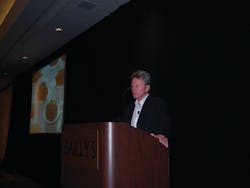Tea Expert Steve Smith Foresees Big Demand For Tea During National Automatic Merchandising Association (NAMA) CoffeeTea&Water Show
Steve Smith, one of the nation’s most successful tea salesmen, presented his case for expanding the tea business during the National Automatic Merchandising Association (NAMA) CoffeeTea&Water show this week at Bally’s in Las Vegas. One of the show’s keynote speakers, Smith gave an overview of the production and preparation methods as well as an in-depth analysis of the tea market, which he sees as growing.
Smith brought an impressive resume to his presentation. He founded some of the most successful tea companies – Stash Tea Co. and Tazo Tea – and he currently operates Steven Smith Teamaker.
Smith sees tea as having great growth potential if tea providers can focus on providing better quality tea.
He said tea is underappreciated in the U.S. because many growers and packagers focus more on price than on quality. He noted that serving have improved a lot over the years, which create new opportunities for tea.
“We’re gradually changing that (underappreciation),” he said. “Younger consumers want more choices and flavors. There is also a certain hipness to drinking tea that didn’t exist before.”
Smith came to the tea business from humble beginnings. He started Stash Tea Co. in the early 1970s after operating a natural food store. Stash Tea Co. supplied tea to schools, stores, offices and vending operators.
From humble beginnings, Stash Tea Co. became the second largest supplier of specialty teas to foodservice.
Smith sold Stash Tea Co. in1993 to a Japanese company and focused his attention on the iced tea market.
He launched Tazo Tea and took an innovative marketing approach; the company used humor in its advertising.
More importantly, Smith believed that tea could command a premium price based on higher quality. “It was a brand that appealed to those new to tea,” he said. He said the company found that consumers were less sensitive about the price of good tea.
Smith stayed with Tazo Tea for seven years after Starbucks acquired the company in 1999. Under Starbucks, Tazo Tea grew to $1.3 billion in annual sales.
This year, Smith founded Steven Smith Teamaker in Portland, Ore.
Smith then reviewed cultivation, manufacturing and preparation of tea.
He said tea is cupped, similar to coffee, to determine its value.
In recent years, herbal infusions have entered the market and are often associated with tea, even though they are not tea, Smith said.
In reviewing the tea market, he noted that plain tea sales are flat but specialty teas are increasing by 10 percent per year and green tea sales have jumped 500 percent in the last five years.
Smith said market observers expect tea sales to reach $15 billion in sales by 2014, but he thinks the market will be larger. “I would say that the number is grossly understated,” he said. He estimates the market will reach $20 billion in the next two years.
One of the biggest challenges that retailers have faced is shortening the preparation time. Traditional tea bags take five minutes to properly infuse.
He noted that the Flavia brew-by-pack system from Mars Drinks allows shorter preparation time. Mars Drinks worked with Smith in launching the Bright Tea Co., which offers a large variety of teas and herbal infusions. Bright Tea offerings are available in packs that are brewed in Flavia machines.
The tea industry’s challenge is to meet the demand of today’s younger consumers, who want convenience and choice, Smith said. “We do this, and tea will become more relevant,” he said.
